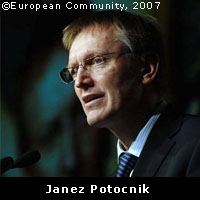Potocnik on competitiveness instruments: same aim, different angle
European Technology Platforms (ETPs), Joint Technology Initiatives (JTIs) and lead market initiatives are all different tools, but are all intended to achieve the same thing: innovativeness and competitiveness in Europe, explained EU Science and Research Commissioner Janez Potocnik on 16 March. Mr Potocnik was participating in a discussion at the European Business Summit in Brussels, and fielding questions from industrial players on the tools that the Commission believes can boost innovation. The initial idea behind the ETPs was to establish research priorities in time for drawing up proposals for the Seventh Framework Programme (FP7), said the Commissioner. But they are now 'living a life of their own', he continued. 'We have used them much more than was originally foreseen. We used them in the design of FP7, especially the cooperation part, but also in the design of Joint Technology Initiatives, which are public-private partnerships,' said Mr Potocnik. ETPs have taken care of the supply side of innovation, and the Commission hopes that lead market initiatives will do the same for the demand side. Lead markets could be developed through public procurement, regulations, standards or intellectual property, explained the Commissioner. 'It's not so much about funding, but about creating the right environment, where conditions are predictable and friendly,' he said. Asked whether the number of initiatives could be confusing for stakeholders, Mr Potocnik stressed that all tools are, and will continue to be inter-connected. He also emphasised that each instrument is addressing the same issue, but from a different angle. Mr Potocnik's co-panellists were all supporters of the ETPs, and involved in them themselves. Opinions on lead market initiatives varied, but all had their own ideas on what is needed in Europe to strengthen competitiveness, and how the European Commission can contribute. Jozef Cornu, Chairman of the EUREKA Cluster MEDEA+, a cooperative programme on microelectronics research, warned against trying to create lead markets solely with investment, pointing out that there are areas in which Europe spends a lot of money, but is not leading. Often leading markets are found in the country in which they were created, he said. Koenraad Debackere, Professor and General Manager at KULeuven Research and Development, welcomed the Commission's moves to establish ETPs, JTIs and lead markets, and spoke in favour of the complementarity and additionality that they bring. He also expressed the hope that the three instruments will foster mobility between disciplines. Asked what he would like to see happen over the coming year, Prof Debackere called for the introduction of procurement policies to encourage research and innovation. The number of ETPs (31) was cited by a number of those present. Bernard Meric, Senior Vice President of Hewlett-Packard EMEA asked whether the Commissioner would support a merger of related ETPs into one body with a legal entity status. The Commissioner didn't regard the number of ETPs as problematic. He stressed that the number has been constant for some time, and that individual ETPs are cooperating with one another. Reducing the number by putting more thematic areas under one roof would lead to too much complexity, Mr Potocnik thought. He underlined once more, however, that ETPs do not and should not depend on the European Commission. They have a life of their own, and if stakeholders believe that changes would be beneficial, they do, can and should implement them. Unusually for industry, there were several requests for the Commission to play a more hands-on role with the ETPs. Dr Cornu called for more intervention in the creation of pan-European standards. If the ETPs themselves do not set standards, then the Commission should jump in and set them itself, he said. Rüdiger Iden, Senior Vice President of Polymer Physics and BASF asked for the Commission to get involved in inter-ETP communication. As ETPs respond to calls for proposals under the Seventh Framework Programme (FP7), there will be some cooperation and some competition. This requires some moderation from the Commission, he said. Professor Iden also called upon the Commission to get more involved in regulation, but in order to de-regulate the market. 'Regulation doesn't mean we need more laws, but more standards,' he said. Mr Potocnik accepted that the industry playing field must be simplified, and that some deregulation is necessary. But 'regulation and deregulation go hand-in-hand. The picture is not black and white,' he insisted. He cited the example of nanotechnology, where the Commission acted quickly to introduce regulations and manage risk. 'If you don't regulate early and fast enough, business will be the loser,' he told participants. To finish the session, the Commissioner was asked what he would like to see happen over the coming year. His response: that the Commission should remain consistent and deliver in real time.



